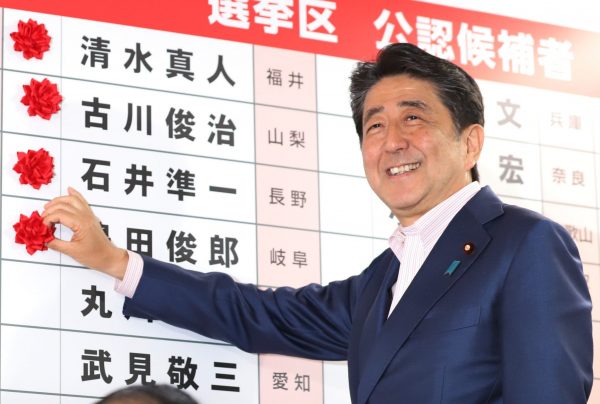This milestone will prompt speculation of what Abe’s legacy is likely to be. Will future generations remember him for driving substantial and lasting change? Or will Abe become little more than a Trivial Pursuit question for Japanese politics geeks?
Japanese prime ministers’ legacies tend to be synonymous with a specific policy or initiative, such as Junichiro Koizumi’s and Yasuhiro Nakasone’s respective privatisation plans for the postal and rail services. Or on a grander scale, they may be enshrined in a longer lasting, eponymous foreign policy doctrine, with the obvious examples being Shigeru Yoshida and Takeo Fukuda. Alternatively, on occasions the legacy is a negative one tainted by scandal, ranging from Kakuei Tanaka’s financial to Sosuke Uno’s sexual indiscretions, and something to vindicate in retirement.
In the case of Abe, it is worth going back to December 2012 when the LDP won a landslide election that brought an end to the Democratic Party of Japan’s (DPJ) three years in power and provided Abe with a rare second bite of the cherry after his term as prime minister from September 2006 to September 2007. At that time, the ‘revolving door’ of Japanese politics was in full swing and the country saw six short-lived prime ministers (Abe included) in as many years. The ‘twisted Diet’ (nejire kokkai) resulted in a deadlock, the Japanese economy was stagnating and its people were still coming to terms with the triple disasters of 11 March 2011.
Internationally, the situation was challenging. Japan’s relationship with the United States was strained under the DPJ, China’s economy overtook Japan’s in 2010 to become the second largest in the world and its behaviour in the East China Sea became more assertive. A fortnight before the election, North Korea obligingly launched a three-stage rocket that was thought to have put a satellite in orbit.
This picture sounds all too familiar today. Abe’s management of relations with the United States is complicated by the unpredictability of US President Donald Trump and the result is a familiar strategy of cosying up as a leading ‘Trump whisperer’ and balancing competing interests — as seen in the recent reset of Japan–China relations. The latter development is a welcome one but could all too easily be derailed by another crisis over disputed territory or conflicting interpretations of history, as seen in the speed and extent to which Japan’s relations with South Korea have soured.
Abe’s attempts to replace the Yoshida Doctrine, which defined Japan’s traditionally low-profile position in the world, with a new and dynamic foreign policy direction that seeks to halt Japan’s perceived decline and overcome post-war constraints is likely to fall foul of the contradictions inherent in its logic and its progenitor’s emphasis on historical revisionism. Short of a more notable achievement, such as Abe’s long cherished constitutional reform, there is little in terms of a legacy to claim here.
Domestically, the impact of Abenomics has been debatable and the much-vaunted policies of ‘womenomics’ appear to have failed. According to the World Economic Forum’s Global Gender Gap Report 2018, Japan ranked 110th, just ahead of Belize, having slipped from 101st in 2012 when Abe returned to power.
Abe has already sought to bask in the reflected glory of iconic diplomatic, cultural and sporting events that have taken place on his watch such as the enthronement of a new emperor, Japan’s first G20 Summit, first Rugby World Cup and second Summer Olympic and Paralympic Games. But who can recall the incumbent prime minister when the previous emperor assumed the Chrysanthemum throne or when Tokyo hosted Japan’s first G7 summit, Summer Olympic and Paralympic Games? Serendipity does not a legacy make.
Similarly, the scandals that briefly threatened Abe’s premiership are likely to be little more than historical footnotes, which demonstrate Abe’s Teflon-like ability to weather political storms that would have forced previous prime ministers to resign.
Instead, Abe is more likely to be remembered for bringing stability to Japan’s domestic politics and centralising decision-making authority within his own position and the ‘prime ministerial executive’. For example, in December 2013 he established a US-style National Security Council in the Prime Minister’s Office. His selection of cabinet and senior bureaucrats is more robust than his scandal-tainted first term in power and he controls his cabinet more closely by requiring ministers to have their speeches approved.
This bolstering of prime ministerial leadership is likely to be Abe’s lasting legacy. But it raises an obvious question: How transferable will this model of centralised authority be to future prime ministers? It also masks a serious challenge to the health of Japan’s democracy.
Abe’s leadership was enabled by the lack of alternatives within the LDP and opposition parties as well as an erosion in press freedoms, record low turnouts across his landslide election victories and negative campaigning. Taken together, this does not bode well for the future and may make Abe’s longevity the exception rather than the new normal.
One obvious question is what Abe will do after he eventually steps down. Although likely to remain in power for the immediate future, it is never too early to start planning for a prime minister’s afterlife. Burnishing a legacy, whatever that may be, is certainly one option.
Hugo Dobson is Professor in the School of East Asian Studies at the University of Sheffield and Fellow of the Academy of Social Sciences.

